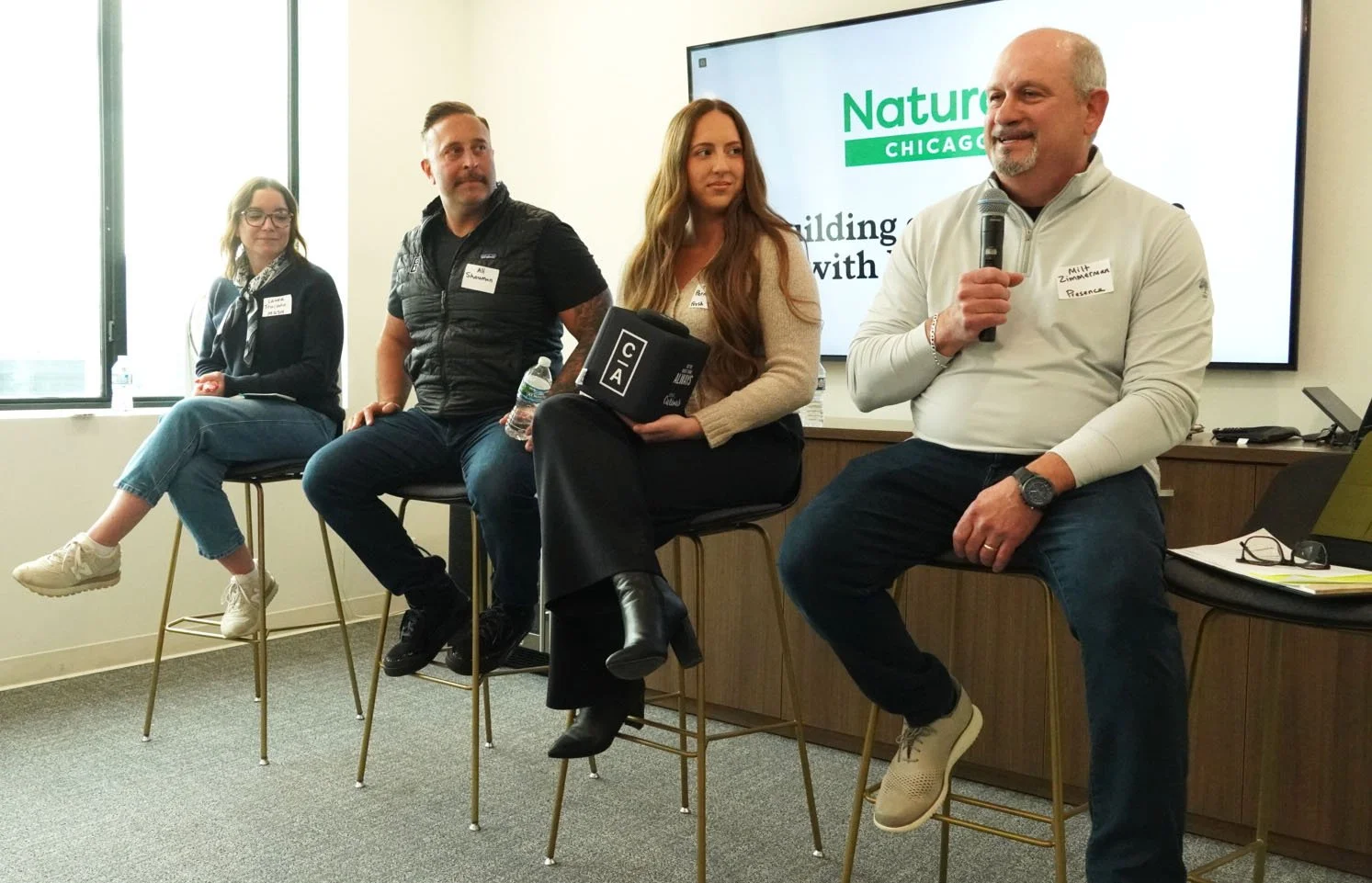Panel of Experts Discussed Steps for Brands to Build a Relationship With a Broker
Panelists Milt Zimmerman of Presence Marketing (with microphone), Tracy Pernatozzi of Fresh Thyme Market, Ali Shouman of host C.A. Fortune, and Laura Troiano of the MUSH brand of oat-based food products provided insights on the topic of Building a Relationship with a Broker.
Food industry brokers can play a major role in the success of brands by helping them get and expand their grocery store shelf space. Many of the most successful natural product brands worked hand in hand with brokers as they grew.
That means that deciding whether and when to choose a broker, and which one to choose, is one of the most important decisions that business founders can make. Naturally Chicago sought to illuminate this topic when it presented “Building a Relationship With a Broker,” a live panel discussion presented on April 2.
The discussion featured a rare joint appearance by two titans in the food brokerage area: C.A. Fortune, which hosted the event at its beautiful offices in Chicago’s West Loop neighborhood, and Presence Marketing, based in the northwest suburb of South Barrington.
Milt Zimmerman, Presence’s longtime executive vice president, served in the dual role of panel moderator. Ali Shouman represented C.A. Fortune in his role as the company’s chief commercial officer.
They were joined by Tracy Pernatozzi, Fresh Thyme Market’s category manager for dairy, who provided the retailer’s perspective, and Laura Troiano, an entrepreneur whose rising-star company MUSH makes overnight oats, oat-based smoothies and protein bars.
Jim Slama of Naturally Chicago (right) introduced the panel.
In his introductory remarks, Naturally Chicago Managing Director Jim Slama explained that the purpose of the discussion was to illuminate the benefits to brands of working with a broker.
“There are a lot of brands who haven't quite figured out that world,” he said. “Building relationships with brokers and sales agencies can really help grow your business, help you understand the overall ecosystem. and work through many other elements of building a brand.”
He turned the microphone over to Zimmerman, whose long career as a broker was shaped by his earlier experiences working with brands. “I employed brokers, and I loved working with my brokers,” he said. “And when I became a broker, my focus was to do all the things that I loved about my brokers and try to avoid what I hated.”
Zimmerman then asked Shouman to define what a broker is. Shouman responded, “A broker is a third-party sales agency that is really there to help you, facilitate finding the consumer... What a broker does is use their services... to get you on the right shelves for your product, so the right consumer sees it and buys it.”
Zimmerman added, “A broker is a conduit between the manufacturer and, in certain cases, the distributor, the manufacturer and retailers, and there's an interaction all the way.”
Pernatozzi provided the perspective of a category manager who has to navigate a flood of inquiries from producers seeking shelf space. “Brokers really come in to create efficiencies,” she said. “They understand my strategic vision. They understand our store layout, the vision of our store, our strategies. They're able to bring me new, innovative products in a timely manner.”
Troiano represented the manufacturer’s perspective on the panel, and she described how important brokers have been in helping lay the groundwork for MUSH’s rapid rise within the crowded healthy snack bar category:
“I really see brokers as being amazing partners in helping you develop channel strategies, retailer strategies and go-to-market playbooks, because the way that you promote at Fresh Thyme and the way you price at Fresh Thyme is going to look a lot different than Kroger, which is going to look a lot different than Piggly Wiggly. I really value the partnership with brokers. They bring a lot of expertise in a lot of key areas.”
Zimmerman then asked when a business should seek a broker. Shouman took the first swing, focusing on how early-stage businesses should approach this question. “If you're a small emerging brand with very little distribution, you have to really think about the cost to go to market and kind of the time that it's going to take you to prove your value proposition to that consumer,” he said. “And so you should look for a broker that has expertise in that emerging brand space, that understands what it's going to take, what the timelines look like.”
Zimmerman then provided the Presence perspective. “We love working with new upstart brands. We love the innovation. We love new stuff that comes along. And so we take a lot of pride in talking to everybody who knocks on our door and really figuring out if they're ready.” Asking rhetorically if there is a sales threshold for brands to partner with brokers, he said, “When you're doing between two to $3 million in brick and mortar [stores]. That's when you're starting to get to the point where you can afford to pay us.”
Pernatozzi said that from the retailer perspective, a broker provides a major assist by streamlining the stores’ relationship with growth-seeking brands. “When we find a new brand we want to bring in, they work with me, they work with my distributor, and they work with you to ensure smooth shipments. So when the product comes in and gets on shelf in a timely manner, they have a lot of retail support as well,” she said, continuing, “They're in our stores every day, making sure that your products actually made it onto the shelf as intended. They're helping ensure that distributors are reordering the products so that you don't have any out-of-stocks or any blips with item launch.”
Troiano, speaking from the brand perspective, said, “Ensure that you have dedicated resource...make sure that somebody is going to manage the relationship with the brokerage, because setting expectations and managing them is really important.”
A networking reception with lots of great food and drink followed the panel discussion.






